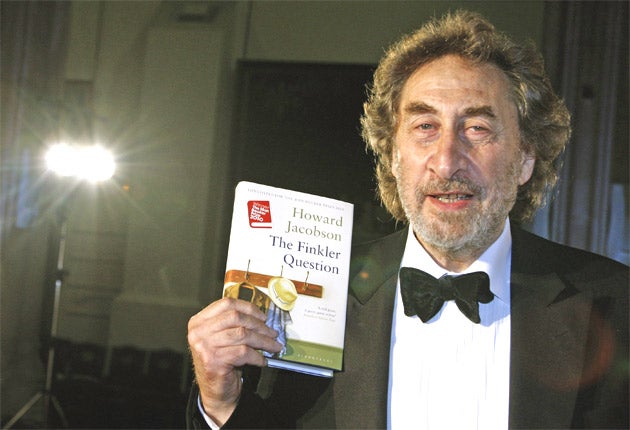Jacobson puts a smile on the face of the Booker
The prestigious literary prize has traditionally spurned comic novels. But not last night

Your support helps us to tell the story
From reproductive rights to climate change to Big Tech, The Independent is on the ground when the story is developing. Whether it's investigating the financials of Elon Musk's pro-Trump PAC or producing our latest documentary, 'The A Word', which shines a light on the American women fighting for reproductive rights, we know how important it is to parse out the facts from the messaging.
At such a critical moment in US history, we need reporters on the ground. Your donation allows us to keep sending journalists to speak to both sides of the story.
The Independent is trusted by Americans across the entire political spectrum. And unlike many other quality news outlets, we choose not to lock Americans out of our reporting and analysis with paywalls. We believe quality journalism should be available to everyone, paid for by those who can afford it.
Your support makes all the difference.According to the predictions, it was the least likely to win, in part for the simple reason that a comic novel has never satisfied the high-minded tastes of previous judges of the Man Booker prize, but last night Howard Jacobson's book broke the mould.
The Finkler Question, a comic-tragic drama about Jewish identity, friendship and loss, which was likened to Shakespeare in its delicate balance between humour and sadness, became the first comic novel to claim the £50,000 prize in its 42-year history. Jacobson, who is a columnist for The Independent, was praised by the former poet laureate Sir Andrew Motion, who was chairing the judges, as the nation's great Jewish novelist and Britain's answer to the American writer Philip Roth. For Jacobson, who had been twice longlisted for the prize, for Kalooki Nights in 2006 and Who's Sorry Now? in 2002, the prize has been a long time coming; in his winner's speech at Guildhall in London he spoke of his bitterness and repeated disappointments over the years, as former judges overlooked his work: "It started in 1983... How long the wait has been."
He was astonished by his victory; he had been sure he would never win the prize that had eluded him for decades – he was so frustrated by his failures that he described the Booker Prize as an "abomination" in 2001.
"I was beginning to look like a novelist who was not going to win it and I was sick of being described as under-rated. So I am truly flabbergasted," Jacobson said, admitting there had been "a bit of bitterness" over previous judging decisions.
"I have been around and writing novels for 30 years. Now I'm being discovered by people who have never read me before," he said, adding that the subject of his next comic novel, whose central character was to be a writer who had never achieved any recognition, might have to be revised.
At the age of 68, he is the oldest Booker winner since 1980, when the 69-year old William Golding won for Rites of Passage.
The Finkler Question is Jacobson's 11th novel. Sir Andrew dismissed the notion that the award had taken into account the writer's bridesmaid status in past years. "There is a particular pleasure in seeing someone as good as that get their just deserts," he said.
He speculated that it may have taken Jacobson – seen by many as a humorist – so long for Booker recognition because "people have been nervous about comedy in the past".
He hailed the novel as "the best book" in a "vintage year" which included Peter Carey, twice a Booker prize winner, among its six shortlisted contenders.
"It's about Jewishness, but so much more. It's laughter, but it's laughter in the dark. It's over the top to say it's Shakespearean but he [Jacobson] certainly knows what Shakespeare knew – that the relationship between the tragic and the funny are intimately linked," said Sir Andrew.
Jacobson, who lives in London, was born in Manchester and read English at Cambridge under FR Leavis. Rather than following in the American Jewish tradition of writing, he called himself an "Eng-lit man" whose favourite writers were Dr Johnson and Charles Dickens. He did, however, jokingly describe himself as the "love child" of [Philip] Roth and Jane Austen.
While his intention was to write "the funniest novel I have ever written", it also became the saddest, partly because three friends died as he was writing it.
The jury took only an hour todebate the winner, and the vote was divided 3-2.
Read Howard Jacobson's column every Saturday in 'The Independent'
Join our commenting forum
Join thought-provoking conversations, follow other Independent readers and see their replies
Comments